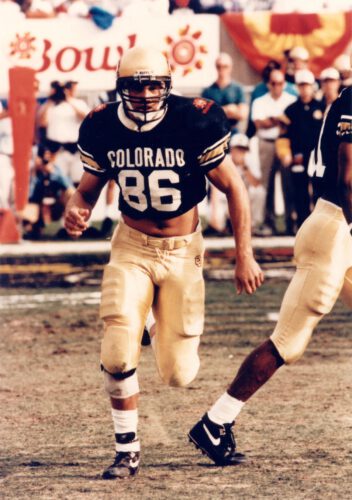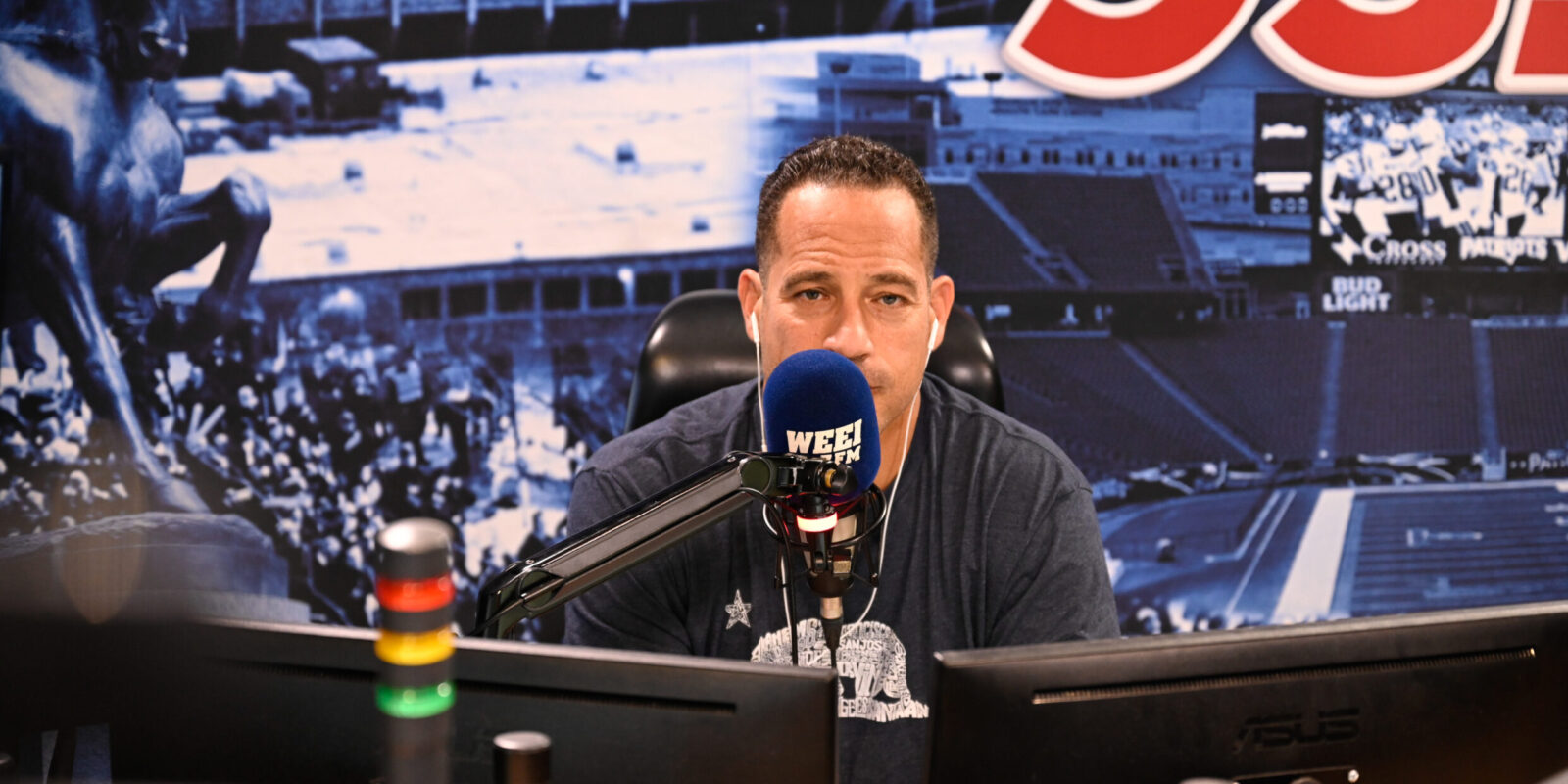Three years since his son Caleb was diagnosed with Type I diabetes, Christian Fauria prepares this fall for his biggest -and most impactful- 25 hour plus telethon to date.

“I HONESTLY don’t know how he does it,” Caleb Fauria tells BostonMan Magazine. “When he’s home he needs to take naps to get through each day.”
The “he” Caleb is referring to is his father, Christian Fauria, host of WEEI’s popular afternoon radio show, “Merloni, Fauria, and Mego” and a former New England Patriots tight end, who was a key contributor with the 2004 and 2005 Super Bowl champion teams.
The “it” is the 25-hour+ annual “Blitz on Diabetes” telethon his dad hosts each fall at the station, raising funds and awareness for the 133+ million Americans living with diabetes -including Caleb who was diagnosed with the condition in 2019.
The goal is to raise as much money in those twenty-five hours. Those twenty-five consecutive hours -which will begin on Wednesday November 16th at 2pm and run through Thursday the 17th at 5pm; and will be the third installment of Christian’s marathon radio extravaganza; with proceeds going directly to the American Diabetes Association.

The previous two “Blitzes” raised $135k over 25 consecutive hours in 2019 and $160k over 28 straight hours in 2021. This year the goal is to set new records in both money raised -and consecutive hours on-air.
“It was something I always wanted to try and do,” Christian explains about the telethon. “The old Jerry Lewis telethons always seemed to amaze me, and once I got into radio I was curious if I could pull something similar off.”
But without any palpable motivation prior, the prevalent thought tilted towards, why actually do one?
“Up until (Caleb’s) diagnosis, we had been very fortunate in my family, we’ve been blessed” Christian says. “We never had to deal with any cancers or severe illness of any kind. Growing up, I never could have imagined having to make the adjustments he has or take on the health responsibility he has had to. I was pretty much a care-free kid.”

Growing Up Cali
BORN September 22, 1971 in Northridge, CA Christian Fauria experienced what he describes as the “greatest” childhood.
“I absolutely loved growing up in ‘The Valley’, there wasn’t anything about it I didn’t like,” Christian fondly recalls. “Everything was so easy-going. My brothers and I basically played video games, sports, and roamed the neighborhood barefoot and shirtless. Growing up where we did in the 80’s was a very unique experience.”
Christian went to high school in nearby Encino, where he hoped to follow in older brother Lance’s footsteps on the Crespi Carmelite football team as a star tight end.
“My older brother was my ultimate idol with everything,” he says. “Whatever Lance did is what I wanted to do. When Lance became a tight end, that’s what I knew I wanted to do as well.”
Except initially his HS football coach saw things slightly different.
“He wanted me to be a quarterback,” Christian exclaims still with a look of discomfort on his face, even after all these years. “So I made sure to throw as many blatant interceptions as I could to force his hand in moving me.”
With the QB experiment over, Christian indeed did go on to supervene Lance at the tight end position, excelling both in football and basketball at Crespi. Naturally, once the recruiting trips began, he also wanted to emulate Lance by attending his brother’s alma mater, the University of Washington in Seattle.
“I was dead set on going to Washington, but they refused to recruit me,” Christian matter-of-factly states. “In fact, no lie, a coach even pulled me out of class one day and said straight to my face, we are not interested, we’re not going to recruit you. I’m pretty sure I had a few choice words vowing to prove them wrong.”

Heading to Boulder
WASHINGTON wasn’t the only school that passed on Christian in the late 80’s. Despite a stand-out schoolboy career at the tight end position, there were not a lot of letters coming in from big conference programs.
“Colorado saw something in me though that a lot of other schools were overlooking,” Christian points out. “And I am forever grateful they did.”
So in the fall of ‘90, Christian joined coach Bill McCartney’s Colorado Buffaloes squad, that would go on to win its only national championship in school history.
Following a freshman campaign that saw him receiving less than desired reps (although both of his receptions that season did result in TDs, one a game-winner) Christian took advantage of the summer heading into his sophomore year to bulk up in the weight room and fill out his body.
“That’s when it all started to click,” Christian beams. “I realized to reach my potential and in order to take advantage of every opportunity in front of me, I needed to become an ass hole.”
In professional wrestling, there is a term used to describe when a “good guy” becomes a “bad guy.” It’s called “turning heel.” That August, Christian turned heel on the coaches -and anyone else in his way- that had overlooked him the previous year.
“When we got back on the field, I remember just tossing guys. I made it a point to not only be the best, I wanted to embarrass all of the coaches who had slighted me.”

Those coaches took notice. Once inserted with the first unit, Christian would go on to haul in 30+ receptions his next three seasons, amassing 325+ yards receiving in each. He would be a key cog in a very formidable offense that paired him as TE with Kordell Stewart at QB, Rashaan Salaam at RB, and Michael Westbrook at WR.
As captain his senior year Christian would lead the Buffaloes into battle week each week against one of the nation’s toughest schedules, culminating with one of the most famous games and plays in college football history.
On Sept 24, 1994 in Ann Harbor Michigan, Stewart connected with Westbrook on a game ending 64-yard ‘Hail Mary’ (a pass that traveled a ridiculous 75 yards in the air) to deliver a 27-26 victory over the favored Wolverines in a play that is forever immortalized as “The Miracle in Michigan”.
“I remember it like it was yesterday. I wasn’t even on the field at the time. They had all the fast guys in,” Christian reminisces. “At no point did I think we were going to lose that game though. Talk about euphoria.”
The only blemish for that ’94 team was a Halloween Weekend loss to eventual national champion and arch-nemesis Nebraska. Christian nevertheless garnered All-American and Big Eight conference honors that season, while being named the team’s “Derek Singleton” recipient for the third consecutive year, which is awarded annually to the Colorado Buffalo who most exemplifies outstanding leadership and character on and off the playing field.
“There were so many cool stories and moments in college football history that I was lucky to be a part of while playing in Boulder,” Christian concludes grinning.

Welcome to The League
SELECTED WITH the 39th overall pick in the 1995 NFL Draft by the Seahawks, Christian finally made his way out to play football in Seattle after being spurned by Washington five years earlier.
He would play well in Seattle over seven mostly uneventful seasons, before finding his way to the Patriots in 2002, coinciding with the grand opening of Gillette Stadium.
“When I got to the Patriots, things were just different,” Christian explains. “They had what felt like a ‘college feel’ for me as far as the guys on the team, the coaches, and just the level of enthusiasm to play football and win games. I felt like I fit in perfectly with those guys.”
He continues: “That first dynasty, those teams were wired tight. All the personal accolades a player can receive are great, but for me, it’s those relationships, the obstacles a team can overcome together and the things that can be accomplished together. That is what I reflect most on about those Patriot teams and what I keep with me forever. It was more than just football.”

Super Bowl Champions x 2
DURING CHRISTIAN’S four years with the Pats, those relationships certainly led to the team doing its share of winning together, highlighted by their two Vince Lombardi trophies in 2004, defeating the Carolina Panthers 32-29; and 2005 toppling the Philadelphia Eagles, 24-21.
“It was good times. Those guys will have my bond and my loyalty forever. There was a connection with those guys, with what we all went through. It really was all the small moments with that group that led to the big ones.”
In the aftermath of the XXXIX victory in Jacksonville, Christian -ever the entertainer- took part in a post win celebration aboard, of all the places, the Pats cheerleaders team bus. From all accounts there, it was a soiree that will live on in Patriots and NEPC lore forever.
Following the 2005 Super Bowl, Christian played two more seasons in the NFL, one in Washington (DC) and his final season with the Carolina Panthers. Before hanging up the spikes for good, he made sure to leave his mark on the game of football one final time.

On November 18, 2007, Christian and Vinny Testaverde hooked up for a two-yard touchdown reception that entered the pair into the NFL record books as having the oldest combined age for a touchdown reception (over 80 years) in NFL history.
With a certain former teammate turning 45 on August 3nd, could Christian be looking over his shoulder to see if Tom Brady and “fill in the blank receiver” might take down his and Vinny’s record?
“Believe me, I monitor this,” Christian doesn’t hesitate admitting. “Tom came on the show a couple of years ago and said I to him, ‘Don’t you have enough records? Can’t you leave this one alone?’ But every time (Tampa Bay) signs an older player I do the math to check and see if our record is safe.”

Like Father Like Son
WITH HIS RETIREMENT from playing in 2008, Christian transitioned into the media world he currently resides with stops at ESPN, and CBS Sports along the way before settling in at his current home, WEEI.
He also found himself beginning to “home coach” his growing son, Caleb, who very early on was showing signs of having the legendary Fauria tight end hands.
“I actually challenged him at a very young age,” Christian says of Caleb. “He was four years old and I wasn’t really holding back throwing him balls, having him run routes in the yard. He showed early on he could definitely catch a ball. I didn’t take it easy on him. I was trying to knock him down, and he held his ground.”
Caleb also remembers those early days: “I had these gloves my older cousin Joseph gave me. (Joseph Fauria, a tight end who played two seasons with the Detroit Lions.) They had this great stick to them. Better than anything my dad used when he played. So he definitely threw hard at me, but I caught my share. Eventually I would wear him down and he would throw his shoulder out.”
Like his father, Caleb dabbled with basketball as a youth, with a little lacrosse and baseball mixed in, but it soon became clear football was his sport.
Also like Dad, Caleb had a coach in HS that wanted to try him at QB. “But I just liked catching the ball,” he says. After all, “we’re a family of tight ends.”

Something Just Isn’t Right
WITH HIS FOCUS now solely on football, Caleb joined Edge Performance Systems in Foxboro to “put on some weight, fill out my body, and prepare for the recruiting process.”
Somewhere during his junior season in 2018 though, he tore his meniscus in the right knee.
“It actually happens all the time, more often than you would think with athletes,” Caleb explains. “The pain wasn’t too bad so I just played through it.”

During the offseason, however, the injury wasn’t getting much better, and by February 2019 Christian ended up taking Caleb to get an MRI. The family opted to repair the meniscus with surgery, hoping to be fully healed by the start of Caleb’s senior season.
Caleb knew something was off though.
“I felt really weird after my surgery,” he says. “Within a couple of weeks my weight had dropped from 215 to 185.”
He was also having trouble seeing, had no appetite and was always thirsty. But with it being the thick of recruiting season, he had a big visit to Iowa lined up, a program with a rich history in producing quality tight ends.
“So we went forward with the trip, but things only continued to get worse. I was literally peeing what felt like every five seconds and my vision was so blurred I could barely see.”
Somehow Caleb made it through the recruiting visit, but by the time he got back home to Massachusetts, he had nothing left.
“I had a mental breakdown, I just started crying,” he remembers. “That’s when I told my mom to take me to the hospital. I told her something just isn’t right.”
Diabetes
AS DOCTORS RAN preliminary tests on Caleb, initial results came back showing no signs of anything unusual.
“We don’t think there is anything wrong with you,” Caleb was told. Caleb’s mom, however, asked to have one more set of tests run, this time for diabetes.
“Those tests came back positive and the next thing you know I am being rushed to Mass General for further testing,” Caleb says.
“My initial reaction was ‘are you kidding me?’ Christian states. “We’re at Mass General trying to wrap our heads around what is going on and before you know it a nurse comes out and is giving us a crash course on diabetes, how to monitor it, what to measure, what he can eat, what he can’t… just like that our entire lives had changed.”

Caleb was diagnosed with Type I diabetes, which is hereditary. Type II diabetes by comparison, is a condition that is developed over time, but can also be treated with improvements in diet, exercise, and mental health.
“I was laying there in the hospital bed and I immediately began googling ways I could still play football with Type I diabetes,” Caleb remembers. “Jay Cutler (Chicago Bears quarterback) and Mark Andrews (Baltimore Ravens tight end) both were playing in the NFL with Type I and were managing it. At that moment I knew I had to get my mind right and focus on what I had to do.”
THE EVENING OF CALEB’S diagnosis was Thursday, April 26th 2019, the night of the NFL Draft. As Caleb lay in his hospital bed, he watched two teammates -T.J Hockenson and Noah Fant- make draft history by being the first set of tight ends from the same school selected in the first round.
Drafted out of the University of Iowa. The very campus Caleb had left mere hours earlier.
“Watching that, even with the news I had just received,” Caleb tells. “Definitely gave me another layer of motivation.”
“We went from essentially not having a care in the world,” recalls Christian. “And now all of a sudden, we have this new thing that’s forever. My mind was racing. ‘How are we going to keep him alive? ‘How is he going to keep himself alive?’ Those first nights I would go into his room every couple of hours and shake him just to make sure he was still breathing. It was definitely pretty freaking scary.”

It Begins with Awareness
“THE WHOLE THING really begins with awareness,” Christian states in explaining both how to begin the process of learning to live with diabetes and what the goals of his telethon are.
“From there we become better educated on where the shortcomings with the system are and where the allocations are needed to help combat this condition. Then we do what we can do fundraise and help create new resources.”
To that end, Christian points out, the American Diabetes Association has been a champion organization to partner with, hosting a wealth of information that -no pun intended- keeps the needle moving in the right direction to cure this deadly condition.

FOR STARTERS, since 2019, the ADA has been a part of twenty states (and Washington DC) with capped copayments on insulin, devices, or diabetes supplies. They continue to fight for the remaining states and ultimately a federal cap.
They fund transformational research and innovations to accelerate the translation of laboratory breakthroughs into clinical advances in diabetes, as well as influencing the research field. This targeted research funding strategy has allowed them to respond quickly to critical gaps while reinforcing commitment in supporting more than 200 innovative research projects each year.
Currently the ADA is funding 242 research initiatives. In 2020, amidst a global pandemic, they helped publish the Health Equity Bill of Rights, which envisions a future without unjust health disparities.
This breakthrough bill ensures the 133+ million Americans living with diabetes or prediabetes, along with the millions more who are at high risk for diabetes will receive equal access to their most basic of human rights -their health- no matter race, income, zip code, age, education or gender.
“They truly are the gold standard,” Christian says of the ADA.

Further, as many as one in four insulin users report rationing their insulin (a common term for skipping doses or taking less than needed). Thus putting themselves at risk for serious and even deadly complications.
The recent pandemic revealed staggering new data on how deadly diabetes is as well. An astounding 40% of all covid-19 related deaths globally have been people living with diabetes.
Of the 133+ million Americans affected by diabetes and prediabetes 37.3 million (or 11.3% of the population) are prevalent. Meanwhile, 96 million Americans age 18 and older have or had prediabetes.
1.4 million Americans are diagnosed with diabetes every year, while nearly 30% of seniors (16 million) aged 65 or older are believed to have either been diagnosed or are undiagnosed diabetics.
Diabetes, however, is not a condition that only targets Baby Boomers. Approximately 283,000 youth under the age 20 are estimated to have diagnosed diabetes. And annually, more children in America are diagnosed with Type 1 diabetes than cancer.
Believe it or not, all of this barely begins to tap into what has become the diabetes epidemic, Christian asserts.
“Education is only the first part of this battle,” he emphasizes. “We haven’t even gotten into the costs yet.”
In recent years the cost of insulin has risen making it very difficult for some to pay for the necessary medication. Diabetes medication has increased 300% over the last 15 years. For some this could mean co-pays of nearly $1000 a month. Depending on the source, some say the increases could be as high as 600%.
After adjusting for population age and sex differences, the average medical expenditures among people with diagnosed diabetes were 2.3 times higher than what expenditures would be in the absence of it.
“I can’t even begin to tell you the number of diabetics who are not receiving proper treatment for no other reason than the sheer costs,” Christian laments.
“And this is why I started the Blitz on Diabetes Telethon.”

The Blitz on Diabetes
AS HE HAS the previous two telethons, Christian is lining up an all star ensemble of guests to co-host one hour segments with him for this fall’s extravaganza on November 16th and 17th.
Larry Bird, Tom Brady, Bill Burr, Bobby Orr, and Bill Belichick are among the Mount Rushmore who have been part of the previous two telethons.

“It’s more about hearing how bats in the belfry I go as the hours wane on though,” Christian acknowledges.
This year Christian is beginning to see the telethon take steps in expanding beyond a regional fundraiser and towards his ultimate goal of a unified nationwide effort.
“That’s eventually where I want it to be,” he says. “To fight diabetes -to blitz diabetes the way we need to- this has to become a coast to coast fundraiser.”
With more national sponsors and media outlets coming on board, Christian reasons, that goal could become a realization over the next few years.

CALEB HAS NOW LIVED -and played football- the past three years with Type I diabetes.
“You learn fairly quickly what your body can and cannot do and how it is going to react to things,” he explains.
He has found that a pre-practice or pre-game peanut butter and jelly sandwich tends to put him at sufficient levels to compete on Folsom Field, where he is now running routes and hauling in footballs donning the same Colorado Buffaloes jersey his father wore thirty years earlier.

And while some days can sometimes be a little more sluggish than others, he has certainly adapted to managing his diabetes.
“That kid has more responsibilities and has had to overcome more obstacles than I have in ten lifetimes,” Christian roars.
AS YOU LISTEN to Christian Fauria talk about his son, this epidemic, and his Blitz on Diabetes Telethon you hear the spirit of a warrior.
Even though he tells you he’s a “care-free kid from The Valley” you know just under that surface is…
The combatant that told the University of Washington coaching staff to go fuck themselves for not recruiting him. The fighter that turned heel in college to embarrass the coaches that dare gave reps to or put any player in front of him. The commander that 3x was chosen for the “Derek Singleton Leadership Award.” The teammate that stood in the foxhole with his fellow soldiers en route to two Super Bowl championships. And most importantly, the father that will stop at absolutely nothing to protect his son.
I WOULDN’T WANT to be diabetes right now. Christian Fauria is bringing a blitz it won’t be able to handle.

For more information and/or to make a donation to Christian Fauria’s 3rd annual “Blitz on Diabetes” marathon extravaganza telethon, please visit this link! It’s never too early to get a pre-telethon donation in to help fight diabetes! Please also visit the Swing Juice apparel link below to purchase one of Christian’s Fauria’s “Crusade for a Cure” hoodies or tees! All proceeds are donated.













